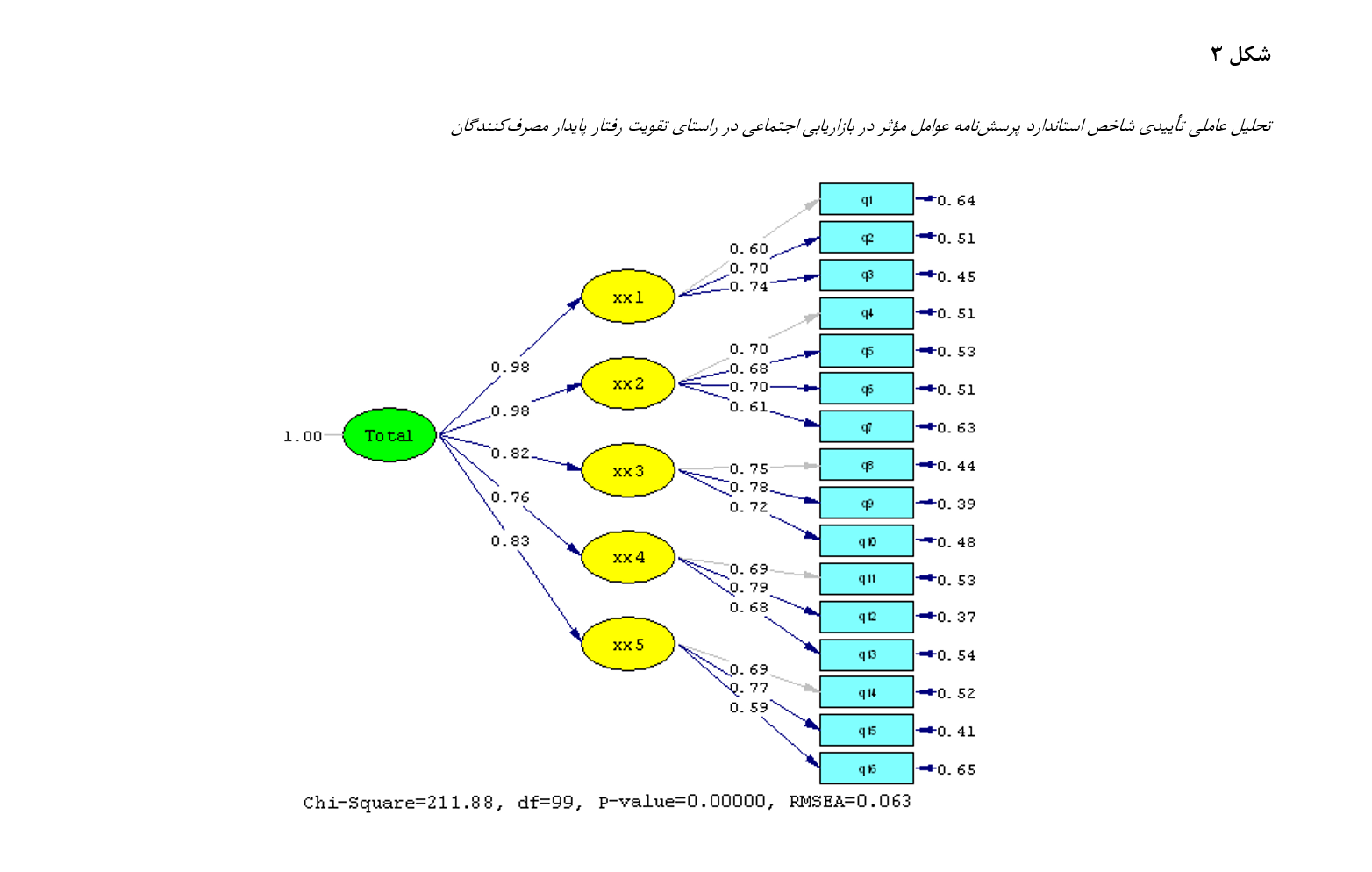طراحی الگوی بازاریابی اجتماعی در راستای تقویت رفتار پایدار مصرفکنندگان (مورد مطالعه: شرکت آریان کیمیاتک)
کلمات کلیدی:
بازاریابی, بازاریابی اجتماعی, رفتار پایدار مصرفکنندگان, رفتار مصرفکنندهچکیده
پژوهش حاضر با هدف طراحی الگوی بازاریابی اجتماعی در راستای تقویت رفتار پایدار مصرفکنندگان در شرکت آریان کیمیاتک انجام گرفت. روش پژوهش به لحاظ ماهیت، اکتشافی بود. جامعه پژوهش در بخش کیفی مقالات انتخابشده از پایگاههای اطلاعاتی داخل و خارج و خبرگان دانشگاهی و متخصصان بخش بازاریابی شرکت آریان کیمیاتک بودند. ابزار پژوهش مصاحبه بود که با 20 خبره به نقطه اشباع رسید. جامعه آماری در بخش کمی کلیه بازاریابان فروش محصولات شرکت آریان کیمیاتک است با شیوه نمونهگیری تصادفی ساده 100 نفر به عنوان نمونه انتخاب شدند. پژوهشگر در بخش کیفی پژوهش ابتدا با مصاحبه با خبرگان و اسناد و مقالات موجود عوامل مؤثر در بازاریابی اجتماعی در راستای تقویت رفتار پایدار مصرفکنندگان را احصا کرد. خروجی این مرحله شناسایی 80 شاخص در قالب 5 بعد اصلی و 16 بعد فرعی بود. در گام دوم از روش مدلسازی ساختاری تفسیری استفاده شد. در این تحقیق مؤلفه اقتصاد و مدیریت بازار شامل استراتژی رقابتی در بازار، بازارسنجی، مدیریت بازار و اینفلوئنسر مارکتینگ تأیید شدند. عوامل مدیریتی شامل استراتژی، مدیریت برونسازمانی، مدیریت ارتباط با مشتری و عوامل تعاملی تأیید شدند. عوامل فناوری و تکنولوژی شامل نیازسنجی و ایدهپردازی، نوآوری و خلاقیت در کار و زیرساخت فناورانه و اپلکیشنهای کاربردی تأیید شدند. عوامل داشتن سرمایههای مالی و انسانی شامل اقتصاد مهندسی شرکت، مهارت ارتباطی و توانمندسازی منابع انسانی و زنجیره تأمین پایدار تأیید شدند. عوامل تبلیغات، برندسازی و کیفیت خدمات شامل تبلیغات با رسانههای اجتماعی و دیجیتال، برندسازی و کیفیسازی خدمات تأیید شدند. در نهایت، مدل پیشنهادی طراحی و تأیید شد.
دانلودها
مراجع
Alshaikh, M., Maynard, S., & Ahmad, A. (2021). Applying social marketing to evaluate current security education
training and awareness programs in organisations. Computers & Security, 100.
https://doi.org/10.1016/j.cose.2020.102090
Amarasinghe, H., Warnakulasuriya, S., & Johnson, N. W. (2021). Evaluation of a social marketing campaign for the
early detection of oral potentially malignant disorders and oral cancer: Sri Lankan experience. Oral Biology and
Craniofacial Research, 11(2), 204-208. https://doi.org/10.1016/j.jobcr.2021.01.013
Bayat, A. (2019). Identifying the Underlying Components of Organizational Ideology. Journal of Public Administration,
(3), 481-508. https://jipa.ut.ac.ir/article_72652.html?lang=en
Javed, M. K., Degong, M., & Qadeer, T. (2019). Relation between Chinese consumers' ethical perceptions and purchase
intentions. Asia Pacific Journal of Marketing and Logistics, 40(3), 327-375. https://doi.org/10.1108/APJML-10-
-0254
Kennedy, A. M. (2016). Macro-social marketing. Macromarketing, 36(3), 354-365.
https://doi.org/10.1177/0276146715617509
Key, T. M., & Czaplewski, A. J. (2017). Upstream social marketing strategy: An integrated marketing communications
approach. Business Horizons, 60(3), 325-333. https://doi.org/10.1016/j.bushor.2017.01.006
Lam, J., & Li, K. X. (2019). Green port marketing for sustainable growth and development. Transport Policy, 84, 73-81.
https://doi.org/10.1016/j.tranpol.2019.04.011
Multala, B., Wagner, J., & Wang, Y. (2022). Durability standards and clothing libraries for strengthening sustainable
clothing markets. Ecological Economics, 194, 107358. https://doi.org/10.1016/j.ecolecon.2022.107358
Nicholson, M., & Xiao, S. H. (2011). Consumer behaviour analysis and social marketing practice. The Service Industries
Journal, 31(15), 2529-2542. https://doi.org/10.1080/02642069.2011.531124
Rezakhani, N., & Aziziankohan, N. (2022). The Relationship between Social Marketing and Consumer Behavior of
Sports Goods in Ardabil County. First National Conference on Sports Management with an Organizational Health
Approach,
Saeibnia, S., & Esmaeili, M. (2021). Investigating the Impact of Social Marketing and Brand Sustainability on Customer
Brand Loyalty in Sepah Bank, Ardabil Province. Knowledge-Based Business Management, 2, 1-10.
https://en.civilica.com/doc/2028544/
Shabanlo Dehnavi, M., & Mokhtaran, M. (2022). Examining the Impact of Social Marketing on Customer Loyalty in
Banks; The Mediating Role of Social Identity. Iranian Political Sociology, 28, 3330-3351.

دانلود
چاپ شده
ارسال
بازنگری
پذیرش
شماره
نوع مقاله
مجوز
حق نشر 2024 تکنولوژی در کارآفرینی و مدیریت استراتژیک

این پروژه تحت مجوز بین المللی Creative Commons Attribution-NonCommercial 4.0 می باشد.










